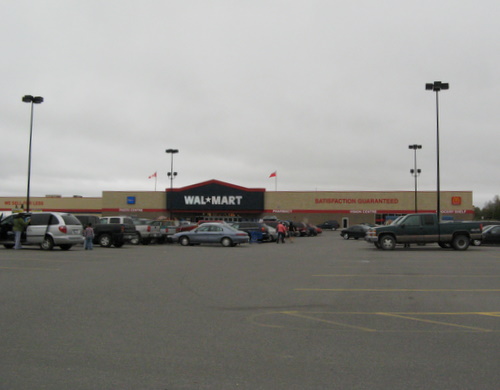
The CBC and National Post are reporting today that a council committee is proposing higher property taxes for certain businesses (gas stations and Wal-Mart were specifically mentioned) that “promote a car culture.” Cesar Palacio, who is more known for his opposition to the St. Clair right-of-way, is on record of supporting this idea. From the CBC article:
Coun. Cesar Palacio said big-box stores should pay higher property taxes, especially for the enormous lands reserved just for cars.
“They encourage the car culture more and more all the time, and that defeats the purpose of one of city hall’s priorities to encourage public transit,” Palacio told CBC News.
Palacio’s idea of a property tax for “car culture” promotion is interesting, but is it an effective planning tool? Another councillor, Paula Fletcher, isn’t so enthusiastic. In her ward, there is a fight against Smart! Centres, a big-box developer, who wants to bring Wal-Mart to South Riverdale. She doesn’t think there is enough of a deterrent, and that there should be a ban on new big-box developments. The city already bans new drive-throughs located in residential areas.
There are also a few other questions. How would a business be defined as “promoting a car culture”? Gas stations, fast-food outlets with drive-throughs, and “Power Centres” would be obvious. But what about malls like Fairview or Yorkdale, that have good subway and bus connections, parking garages (instead of just surface lots), and are designed to accommodate pedestrians — at least once they are inside the mall? Would the tax be high enough to be an incentive for big-box stores to make themselves more pedestrian and transit friendly? And would a suburban plaza in Scarborough or Etobicoke built in the 1960s or 1970s be taxed the same as a new power centre in a more urban area, like Stockyards or the new Wal-Mart planned in South Riverdale?
This interesting proposal, should it ever go forward, could be effective in an arsenal of planning tools to promote intensification and a more urban environment. But as a stand-alone solution, Fletcher may be right saying that it is not enough.




21 comments
A simpler and cleaner solution would be to simply tax all parking spaces — a proposal that was initially suggested by staff, but which never made it to a vote, in the “new taxes” debate.
Taxing things for “promoting car culture” is far too vague and would become arbitrary. Better to target the specific supports that reflect the real costs of supporting cars.
Another obvious way of targeting car culture is the additional tax on car licenses that council postponed during the summer.
But at least it’s good to see unexpected councillors coming up with these kinds of ideas.
Another possibility would be to sever the operation of parking lots from the stores they serve. That is, have a parking lot operator who charges people arriving by car for the cost of parking, rather than having the cost of parking included in the price of the goods sold and paid for by all customers to the store. If parking wasn’t seen as ‘free’, this would likely change behavior.
While its a good start, we need to make sure that other municipalities follow suit. Otherwise big box stores will continue to grow in the suburbs outside of Toronto (where they wouldn’t be banned)which would even further increase “car culture”.
The book, “The High Cost of Free Parking” should be required reading for anyone involved in urban planning (or planning of any kind, really). It really shows how parking distorts the entire urban landscape, and that the spots allotted for parking aren’t arrived at by any real scientific method or subject to a cost/benefit analysis. Parking – be it surface lots, parking structures, or curb-side parking (actually – especially curb-side parking, which is financed by the public) is massively underpriced, and constitutes a massive subsidy for drivers.
Think about it: in order to accommodate parked cars on the road, we build our roads between 33-50% wider than their use for driving requires. For a mere ~$50 you can obtain a 6 month permit to park your car on the street. That is, far and away, the cheapest rent for real estate in Toronto. Imagine the outcry if the homeless erected tents where curb-side parking spots were, and offered to pay $10/month. In essence, we value space for cars over space for people.
In order to raise revenue it is time to start charging for parking in accordance with its cost: both fiscal and societal. It would be a far easier matter to control congestion by charging for parking at a much higher rate than to institute congestion or road tolls. And certainly, private “big box” parking lots ought to be taxed to reflect both their economic and social cost.
Here’s the letter from Palacio: http://www.toronto.ca/legdocs/mmis/2007/ex/bgrd/backgroundfile-6206.pdf
I think there’s a big difference between on-street parking on residential streets, and big box parking lots. On-street parking is a natural traffic calmer, f’rinstance  compare a street in Toronto with the same width of street in Scarborough or Mississauga. And usually it’s self-regulated by its relative scarcity.
Big box parking, on the other hand, not only has absolutely no community benefit, but is almost always significantly oversupplied, because the developers want to make sure it looks to customers like there’s plenty of parking available. Usually there’s a huge part of the lot with virgin spaces that have rarely, if ever, seen a car.
Personally, I would be interested by either idea. Let’s say we restrict all new big box/power centres in 416 (not just in residential areas… most new power centres are being built in traditional employment areas, anyway)… and tax all parking spaces for “grandfathered” developments on a graduated scale, so the more spaces on a property, the higher the rate.
Palacio’s motion is interesting, but it deals only with gas stations, and while it does refer to auto travel vs. non-auto travel, the “car culture” aspect is pretty minimal… there’s much more emphasis on the longer-term environmental costs and the social/nuisance aspects. Which I would agree with. Gas stations may be necessary for drivers, but if we’re going after car culture, better to go after things like the big box retail, drive-thrus etc.
Not totally relevant, but I had a fantasy this morning of a tax on the purchase and installation of car stereos with thumping bass.
If there was a financial disincentive for gas stations (and incentives for sustainable buildings) the first new building in years on Danforth between Donlands and Coxwell wouldn’t be an Esso/Tim Hortons. There are gas stations at Coxwell/O’Connor (x2) and Woodbine/Danforth if people really need gas.
I don’t understand Fletcher’s opposition to this – it’s possible to tax something in one area and forbid it in another – look at new parking pads being banned outright in some wards. Plus it’s a new tax (ahem – revenue measure) and isn’t taxing a good thing these days?
Taxing parking spaces isn’t necessarily a new idea from staff. But taxing asphalt wouldn’t be popular with a lot of public institutions – schools, cop shops, most government buildings – and their unions though. Because when you begin to look at what amount of land is given over to hard asphalt, it’s not all evil big Sprawlmarts.
York University has built a number of parking structures over the last decade due to a (zoning?) requirement that allowed them to use only 10% of the area for parking. Does any one know why this restriction applied to York and not commercial properties? Or whether there are other institutions which have the 10% maximum parking rule?
McKingford: thanks for the heads-up, I’m looking forward to reading The High Cost of Free Parking.
I think economic arguments travel a lot further beyond public spacing activists than the usual qualitative arguments.
I really find this baffling.
Cesar Palacio was one of the most vocal opponents of the St Clair streetcar right-of-way for years, as he was very concerned it would have an adverse effect on cars driving to shops on St Clair.
His office does not seem to remotely care about dangerous drivers or illegal car parking on St Clair and the surrounding neighbourhoods.
I think he is generally one of the most pro-car anti-transit councillors …
One of the benefits of going to a ‘big-box’ store is the ease of parking in the ‘free’ lots.
Perhaps this is a major reason for the popularity of these stores.
Many drivers today don’t want to spend time searching for a street parking space and then feeding a parking meter.
And lets not forget that any additional costs to store owners for parking facilities will be pased along to customers. Who would advocate a cost-of-living increase, especially for low income families?
The tax would encourage these big box stores t build on a smaller footprint, thus lowering their tax costs.
I rode my bike to the big box outlets at St Clair and Keele a few months ago and I was astounded to find not a single bike rack anywhere. And its not as if that set of stores is far from urban areas.
Come on George, low-income families benefit a lot more from transit- and pedestrian-friendly cities than they do from giant parking lots. And transit and street improvements are presumably where new parking taxes would be spent.
Truly low-income families either don’t a car or spend a disproportionate share of their income on one. Efforts to discourage car use benefit everyone in a variety of ways, but low-income earners see the greatest financial benefit when they no longer need to own a car. And while we all benefit from the faster travel times that come from greater investment in transit, those who take it for all their trips benefit the most.
George Dunbar > I think in your comment you already acknowledged that the cost of so-called free parking is already passed on to customers (parkers and non-parkers alike) so any charging for parking would merely be a reallocation of who pays for parking.
By it’s very nature the Big Box type of shopping experience (if you can call it that) promotes car driving. If you’re a lower-income or higher-income family going to stock up at Wal-Mart it sure is easier to load up the cart and then heave it all into the trunk so that you’re all done in the one trip because of the distance to the Wal-Mart. Compare this with the way people shop for produce and baked goods on urban avenues such as College or St. Clair. People who live within walking distance or convenient transit are more likely to make multiple trips through the week to pick up a few things. This used to work in the case of the Wal-Mart predecessors, such as The Bargain Shop, the Bi-Way, Woolworths, Kresge’s and Bargain Harold’s. They were smaller stores and usually integrated into the commercial streetscape, and because there were a number of them, one could always be found in a neighbourhood. Contrast this with Wal-Mart or Costco, which in their present form are ginormous and spaced few and far between. They encourage people to make one trip by car and load up on their goods. As much as those retailers would try to resist it here in the GTA, they need to create an urban version of their stores that would blend into the neighbourhoods, and not have the vast sea of asphalt around them. Some are already doing this, such as Best Buy, following their own examples in Vancouver where they have had to adapt. The Wal-Marts of the world are not going away, but if we can make it worth their while to adapt to the urban environment, maybe it can benefit them as well as us.
Ok, go for it. Tax “big box” (whatever that actually means – they City won’t nor can tell you) parking. In return, I want the cost of constructing the parking on main streets returned to me (my property tax money was spent). And, I want the cost of maintaining those spaces taken off my property taxes. In return, the City can tax the real cost of providing parking for main street retailers. They’re free riders, plain and simple. They can turn around and price that cost to them in the goods they sell, no problem. Y
Heres an idea…why not stop trying to propell society backwards a hundred years by taking away peoples right to individual movement, and spend your obviously abundant energy working toward the abolition of the gasoline combustion engine?
If tomorrow cars could run on some other benign compound, would driving still be an issue? or is this part of a greater collectivist agenda? I wonder.
This is nonsense talk. I resided in the City of Toronto and the costs of Public Transportation is 2.75(each way) , which is way higher than going downtown and paying 5 bucks flat for a parking rate or sometimes even cheaper at certain hours , how is this encouraging people to take public transportation. Public transportation costs should be no higher than $1.25 in the City of Toronto.